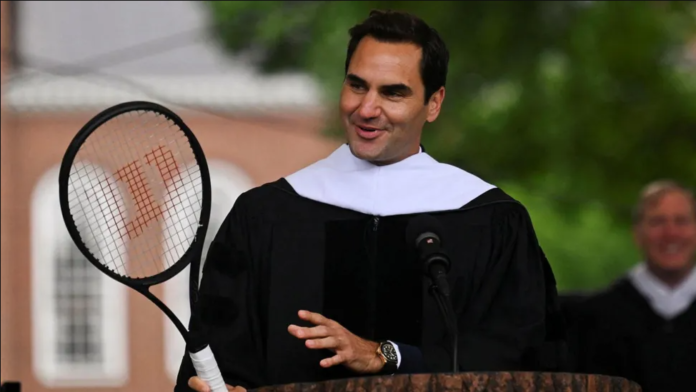Roger Federer declared the main reasons for his success were “grit” and hard graft as he rejected the theory his tennis game was “effortless”.
Federer, one of sport’s highest achievers, looked to set the record straight as he delivered a graduation speech at Dartmouth College in the United States.
The Swiss swapped the shorts he had worn “almost every day for the last 35 years” for a robe that was “hard to move in” as he spoke when receiving a Doctor of Humane Letters degree from the New Hampshire institution.
The 20-time Grand Slam winner, who hung up his professional racquet in 2022, talked about how “awful” he finds the word ‘retired’.
He said he had instead “graduated tennis” and, like those he was speaking to, had “finished one big thing” and was “moving on to the next”.
The 42-year-old then went on to deliver three “tennis lessons” he had “relied on through this transition”, which he identified as:
- “Effortless” is a myth
- It’s only a point
- Life is bigger than the court
Federer won Wimbledon eight times and was renowned for the stylish and elegant nature of his game.
“People would say my play was effortless. Most of the time, they meant it as a compliment,” he said in Sunday’s ceremony. “But it used to frustrate me when they would say, ‘He barely broke a sweat’, or, ‘Is he even trying?’.
“The truth is, I had to work very hard to make it look easy.
“I didn’t get where I got on pure talent alone. I got there by trying to outwork my opponents.
“Most of the time, it’s not about having a gift. It’s about having grit.”
‘You want to become a master at overcoming hard moments’
On his second lesson about it being “only a point”, Federer explained it was possible to “work harder than you thought possible and still lose”, like he had, as “tennis is brutal”.
He referenced his famous five-set defeat by Rafael Nadal in the 2008 Wimbledon final and commented that “in tennis, perfection is impossible”, with him having won 80% of 1,526 singles matches.
“When you lose every second point, on average, you learn not to dwell on every shot,” said Federer.
“When you’re playing a point, it is the most important thing in the world.
“But when it’s behind you, it’s behind you. This mindset is really crucial, because it frees you to fully commit to the next point and the next one after that with intensity, clarity and focus.
“You want to become a master at overcoming hard moments. That to me is the sign of a champion.”
When speaking about his third lesson that “life is bigger than the court”, Federer said from the start of his career he saw how “tennis could show me the world but tennis could never be the world”.
He added: “I’m here to tell you from the other side of graduation that leaving a familiar world behind and finding new ones is incredibly, deeply, wonderfully exciting.”

